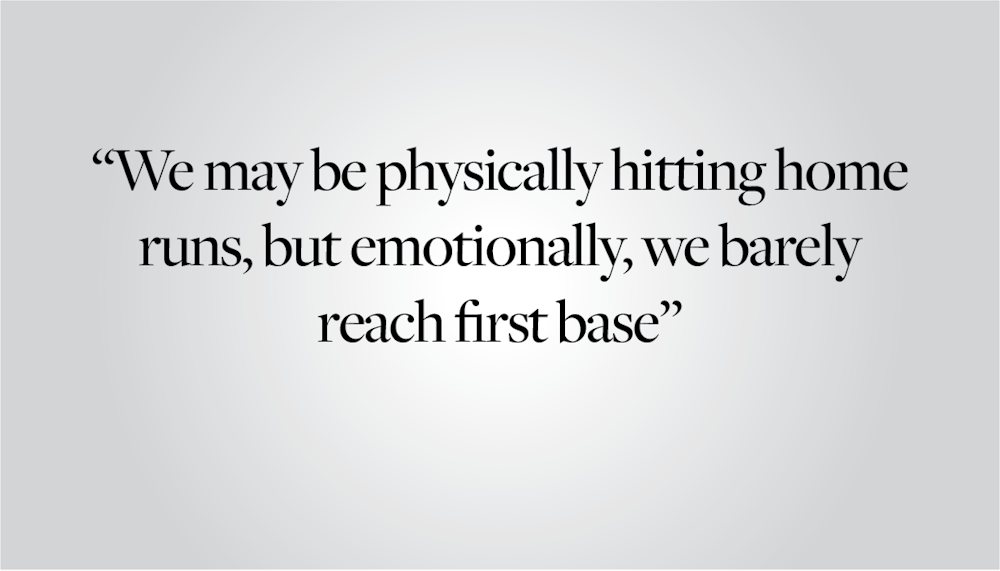Have you ever used bases to describe a sexual encounter? The baseball bases analogy has been used for decades in literature, media and real life to not-so-subtly indicate the extent of physical intimacy in a hookup. According to the teen magazine, Seventeen, one definition of the bases is as follows: first base is kissing, second base is touching above the waist, third base is stimulating below the waist and fourth base (or a home run) is having sexual intercourse. Despite the metaphor's long-lived legacy, it is outdated. Not only does it rely upon a traditional, heterosexual and cisgender definition of sex itself and misogynistic ideas about men “scoring” with women and tallying their sexual conquests, the bases also imply linear progression of increasing intimacy. But today, sexual encounters often serve as the predecessor for a romantic encounter. What do the bases mean in practicality when hookup culture has made a genuine conversation feel more intimate than sex for some young people? We, as active or passive participants in this culture, should challenge why these norms are changing and try to understand what implications such a reversal will have on the future of intimacy.
Plenty of love stories on campus started with dance floor makeouts in frat house basements or from random Tinder hookups driven by algorithms. The thought of going on a real date before having a sexual encounter with that person can feel abnormal. The chronology of becoming intimate with someone else no longer follows the standard baseball metaphor like many of us were taught when we were younger.
If sex is first base for a sizable chunk of people, even if it isn’t for most, being able to hang out with that person in a non-sexual context is a home run. A one night stand is first base, and going grocery shopping together is fourth. These jokes poke fun at how nowadays, relationships blossom from sex rather than from emotional intimacy first, which seems to be a pattern among Brown's student body.
Hookup culture can create pressure to separate emotional connections from physical intimacy. But when we deliberately unlink the sexual and emotional aspects of romantic encounters, we do a disservice to our intimate relationships. We may be physically hitting home runs, but emotionally, we barely reach first base. To me, this says that we are contributing to a culture that discourages emotional vulnerability, which is the foundation of healthy relationships, potentially jeopardizing the health of our future and more serious connections.
It’s normal to feel like relationships that lack emotional intimacy are the most pervasive on campus, but the reality is that most students aren’t looking exclusively for hookups. From those struggling to stay in their long-distance relationships to couples who meet online before ever stepping foot on campus, I’ve witnessed the diversity of what relationships can look like since I first arrived at Brown. These relationships all went through different sexual and emotional stages, or bases, to get to where they are, and certain bases will fit better for some people than they do others. A purely sexual relationship works for some, but it’s important to actively reflect on whether that approach fulfills you too.
I’ve been thinking about the pressure that first-year students on campus must be experiencing this year — pressure to have an active sex life while simultaneously searching for a long-term partner. There is no right answer or moral high ground tied to any one type of relationship. First-years are coming from all different backgrounds in regards to their high school context and dating experience. Some cannot fathom having sex with someone without going on a date beforehand. Others have only found romantic connections after a sexual one. And for the vast majority of incoming first-years, sex is unfamiliar. Every person has their own phases of a relationship that make the most sense for them and their own ideas about what their “bases” are. But we should be aware of the external pressures that may be impacting the way we engage in them. When you are participating in something that doesn’t feel right, you should take note, because ultimately, in college, we should prioritize self-discovery and defining the “bases” for ourselves.
If you have questions about sex or relationships that could be discussed in a future column, please submit questions to an anonymous form at https://tinyurl.com/BDHsexcolumn. Anusha Gupta ’25 can be reached at anusha_gupta@brown.edu. Please send responses to this opinion to letters@browndailyherald.com and other op-eds to opinions@browndailyherald.com.





